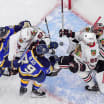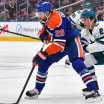CRANBERRY, Pa. -- Pittsburgh Penguins center Sidney Crosby has never been one to dissect his game all that much, to pore over every detail on every shift to see what happened, what better play he might have been able to make.
Sidney Crosby, Penguins must convert chances against Senators in Game 2
Pittsburgh captain feels better execution is key to tying Eastern Conference Final

"Over and done with" is his philosophy. It stayed that way Sunday, the day after he was held off the score sheet and limited to two shots on goal, his only shot attempts, in a 2-1 overtime loss to the Ottawa Senators in Game 1 of the Eastern Conference Final at PPG Paints Arena.
Game 2 is in Pittsburgh on Monday (8 p.m. ET; NBCSN, SN, TVA Sports).
"You don't need to change too much," Crosby said. "Sometimes it's just a matter of execution."
In this case, Crosby is spot on.
RELATED: [Hagelin questionable for Game 2 | Penguins backup defensemen playing leading roles]
A shift-by-shift dissection of his Game 1 shows he and linemates Jake Guentzel and Bryan Rust had no trouble getting through the Senators' 1-3-1 setup in the neutral zone, that they had no trouble gaining the offensive zone and spending time there. It wasn't always with speed or clean, but they were there and they had a few opportunities. Crosby, in fact, nearly had two assists in his first four shifts.
Guentzel's deflection of Ron Hainsey's shot, which was created by Crosby's pass to the point, went off the crossbar at 3:07 of the first period. Then, at 5:22, during the Penguins' 5-on-3 power play, Patric Hornqvist's one-timer off a Crosby pass rang off the left post.
Crosby used his skates to set up Evgeni Malkin for a rush chance down the middle that Senators goalie Craig Anderson had to stop at 7:32 of the second period. That was during a delayed penalty against the Senators.
On his next shift, Crosby and Guentzel had a strong give-and-go play that set up a shot for defenseman Olli Maatta and a tip opportunity by Rust. Anderson made the save at 11:22.
There were more.
Crosby had what looked like a perfect setup pass from behind the goal line to Guentzel 11 minutes into the third period, but Senators defenseman Erik Karlsson got in the way and broke it up. Guentzel would have had an easy one-timer with half the net staring at him.
There were times later in the third period when Crosby, Guentzel and Rust forechecked aggressively to create possession down low, which is exactly what they want to do. Nothing materialized in front.
In overtime, on Crosby's shift before he was on the ice when Bobby Ryan scored the winner for Ottawa, he and his linemates were attacking again, going to the front of the net, trying to shield Anderson's eyes from a shot from the point. It didn't work.
"We had our chances," Crosby said.
They didn't make them count, which is why this dissection of Crosby's performance becomes necessary.
The Penguins scored one goal and were outshot 32-17 at even strength. Crosby was held without a point and limited to one even-strength shot on goal, which came 3:51 into overtime.
"I think maybe at times during the game [as a line] we got impatient with the puck below the goal line or when we had possession we were maybe looking for plays that weren't there," Rust said.
That makes them no different from the Penguins' other three lines and their six defensemen, but it stands out when the opposition seemingly does the job of shutting down No. 87, especially limiting him from making plays from behind the goal line, which is where he's most dangerous.
Crosby tried, but he couldn't get anything going from behind the goal line to the front of the net.
"I just think we have to recognize where the opportunities are on the rink to create, and there's going to be some situations where we can't," Penguins coach Mike Sullivan said. "And when we can't, we've got to hang on to the puck. We've got to exercise some patience. We've got to force them to have to expend energy defending us. And maybe it might be one of those cases where we have to wait for our next shift. The important thing is I don't think we need to force things that aren't there."
That could be a reason why Crosby brought up the idea of trying to hang onto the puck below the goal line more in Game 2. It's not that he thought he gave it up too soon too often in Game 1, but there were times when he might have had more space than he thought he did.
That's part of the adjustment from one round to the next, especially when you go from a crash-and-bang speed series like the Penguins played against the Washington Capitals to facing a passive, wait-for-your-mistake team like the Senators, who pack the front of their net to protect Anderson.
"They're committed to defending there, so it's about shooting pucks and getting guys in that area to get rebounds, create traffic and screens, stuff like that," Crosby said. "We don't have to change anything, but we have to make sure when we get opportunities to shoot we shoot it, and we need to compete for rebounds and get our sticks on those."
Do that and maybe this dissection of Crosby's game, his line's game, will be unnecessary after Game 2. Maybe we'll instead be talking about how their time spent in the offensive zone and their chances led to production and a Penguins win.
"It's going to be more of the same so we have to find ways to improve, try to find ways to get loose and create opportunities," Crosby said. "And put 'em in."

















